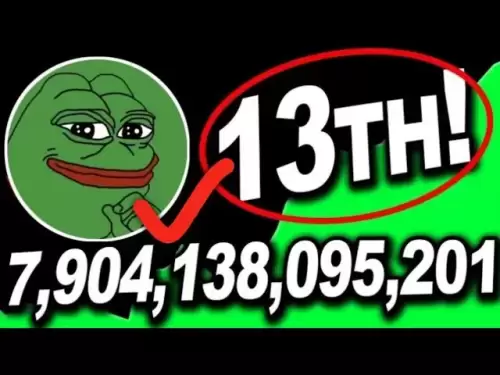-
 Bitcoin
Bitcoin $106,754.6083
1.33% -
 Ethereum
Ethereum $2,625.8249
3.80% -
 Tether USDt
Tether USDt $1.0001
-0.03% -
 XRP
XRP $2.1891
1.67% -
 BNB
BNB $654.5220
0.66% -
 Solana
Solana $156.9428
7.28% -
 USDC
USDC $0.9998
0.00% -
 Dogecoin
Dogecoin $0.1780
1.14% -
 TRON
TRON $0.2706
-0.16% -
 Cardano
Cardano $0.6470
2.77% -
 Hyperliquid
Hyperliquid $44.6467
10.24% -
 Sui
Sui $3.1128
3.86% -
 Bitcoin Cash
Bitcoin Cash $455.7646
3.00% -
 Chainlink
Chainlink $13.6858
4.08% -
 UNUS SED LEO
UNUS SED LEO $9.2682
0.21% -
 Avalanche
Avalanche $19.7433
3.79% -
 Stellar
Stellar $0.2616
1.64% -
 Toncoin
Toncoin $3.0222
2.19% -
 Shiba Inu
Shiba Inu $0.0...01220
1.49% -
 Hedera
Hedera $0.1580
2.75% -
 Litecoin
Litecoin $87.4964
2.29% -
 Polkadot
Polkadot $3.8958
3.05% -
 Ethena USDe
Ethena USDe $1.0000
-0.04% -
 Monero
Monero $317.2263
0.26% -
 Bitget Token
Bitget Token $4.5985
1.68% -
 Dai
Dai $0.9999
0.00% -
 Pepe
Pepe $0.0...01140
2.44% -
 Uniswap
Uniswap $7.6065
5.29% -
 Pi
Pi $0.6042
-2.00% -
 Aave
Aave $289.6343
6.02%
How to participate in staking in Exodus?
Exodus simplifies crypto staking, supporting various coins but not all; check compatibility and understand risks like slashing penalties before starting. Rewards vary, and basic crypto knowledge remains crucial.
Mar 11, 2025 at 09:51 pm
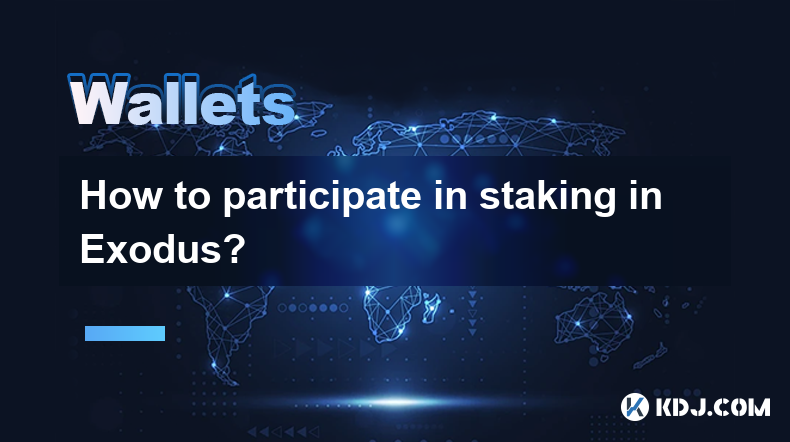
Key Points:
- Exodus supports staking for several cryptocurrencies, but not all. Check compatibility before proceeding.
- The process generally involves holding your cryptocurrency in your Exodus wallet.
- Staking rewards are dependent on the specific cryptocurrency and network conditions.
- Understanding the risks associated with staking, such as slashing penalties (in some cases), is crucial.
- Exodus simplifies the process, but basic crypto knowledge is still beneficial.
How to Participate in Staking in Exodus?
Exodus is a popular cryptocurrency wallet known for its user-friendly interface. While not all cryptocurrencies support staking, Exodus integrates staking functionality for several coins directly within its wallet. This makes participating in staking relatively straightforward for users. However, it's crucial to understand the nuances before you begin.
First, you need to ensure the cryptocurrency you want to stake is supported by Exodus. Not all coins offered in Exodus are stakable. Check the Exodus website or in-app information for the specific coins currently enabled for staking. This is a critical first step to avoid disappointment. You’ll find details on supported coins and any associated requirements within the app itself.
Once you’ve confirmed your coin's eligibility, the next step is to acquire the cryptocurrency. You can purchase it through various exchanges and then transfer it to your Exodus wallet. Remember to always double-check the receiving address before initiating a transfer to avoid irreversible loss of funds.
After successfully transferring your coins to your Exodus wallet, you're ready to start staking. The process is usually as simple as selecting the cryptocurrency you wish to stake within the Exodus wallet interface. There's usually a dedicated section or button for "Staking" or a similar term. Look for the specific instructions provided by Exodus for the coin you've chosen, as the process might vary slightly between different cryptocurrencies.
The staking process itself is generally automated. Exodus will handle the technical aspects of participating in the consensus mechanism of the chosen cryptocurrency. This eliminates the need for manual configuration or running specialized nodes, which simplifies the overall staking process significantly.
However, keep in mind that staking rewards vary considerably. The amount of reward you receive depends on several factors, including the total amount of cryptocurrency staked, the network's current inflation rate, and the specific cryptocurrency's consensus mechanism. These factors are often outside of your control.
It's crucial to understand the risks involved before initiating staking. Some Proof-of-Stake (PoS) networks impose penalties, known as "slashing," for actions like downtime or misbehavior. While Exodus aims to simplify the process, ensuring your wallet remains online and operational is vital to avoid these penalties. Always refer to the specific terms and conditions associated with staking each particular cryptocurrency.
Furthermore, the value of your staked cryptocurrency is subject to market fluctuations. Just like holding any cryptocurrency, your staked assets are subject to the inherent volatility of the cryptocurrency market. Therefore, it’s essential to have a clear understanding of your risk tolerance before participating in staking.
Exodus provides a user-friendly platform, but it doesn't eliminate the need for basic crypto knowledge. Understanding the underlying principles of staking, the specific cryptocurrency's consensus mechanism, and the associated risks is crucial for making informed decisions. Conduct thorough research before committing any significant portion of your crypto holdings to staking.
Frequently Asked Questions:
Q: What cryptocurrencies does Exodus support for staking?
A: Exodus regularly updates its supported staking coins. Check the Exodus app or their website for the most up-to-date list. The list changes frequently, so relying on outdated information could lead to disappointment.
Q: How often are staking rewards paid out?
A: The frequency of reward payouts varies depending on the specific cryptocurrency. Some networks pay out rewards daily, while others might have weekly or monthly payment schedules. The details will be outlined within the Exodus app for each supported coin.
Q: Are there any fees associated with staking in Exodus?
A: Exodus itself typically doesn't charge fees for staking. However, the underlying cryptocurrency network might have transaction fees associated with receiving your staking rewards. These network fees are standard for most blockchain transactions.
Q: What happens if my Exodus wallet goes offline while staking?
A: The impact of an offline wallet depends on the specific cryptocurrency and its consensus mechanism. Some PoS systems might penalize you (slashing), while others might simply reduce your rewards during the downtime. Always prioritize maintaining a stable internet connection for your wallet.
Q: Is staking in Exodus safe?
A: Exodus implements security measures, but no system is entirely immune to risk. The safety of your staked assets also depends on the security of the underlying cryptocurrency network. Always maintain strong password practices and use multi-factor authentication if available.
Q: Can I unstake my cryptocurrency at any time?
A: The ability to unstake varies depending on the cryptocurrency. Some networks have a lock-up period, meaning you can't access your staked coins immediately. Check the specifics for the cryptocurrency you intend to stake within the Exodus app.
Q: What is the minimum amount I need to stake in Exodus?
A: The minimum staking amount depends on the specific cryptocurrency. Some coins may require a substantial amount to participate effectively, while others have lower thresholds. Consult the in-app information for each coin to determine the minimum requirement.
Q: How do I claim my staking rewards in Exodus?
A: Claiming rewards is typically automated within the Exodus app. The rewards will usually be automatically added to your wallet balance once they're processed by the network. However, some coins might require a manual action to claim rewards. Check the app for instructions specific to your chosen cryptocurrency.
Disclaimer:info@kdj.com
The information provided is not trading advice. kdj.com does not assume any responsibility for any investments made based on the information provided in this article. Cryptocurrencies are highly volatile and it is highly recommended that you invest with caution after thorough research!
If you believe that the content used on this website infringes your copyright, please contact us immediately (info@kdj.com) and we will delete it promptly.
- 2025-W Uncirculated American Gold Eagle and Dr. Vera Rubin Quarter Mark New Products
- 2025-06-13 06:25:13
- Ruvi AI (RVU) Leverages Blockchain and Artificial Intelligence to Disrupt Marketing, Entertainment, and Finance
- 2025-06-13 07:05:12
- H100 Group AB Raises 101 Million SEK (Approximately $10.6 Million) to Bolster Bitcoin Reserves
- 2025-06-13 06:25:13
- Galaxy Digital CEO Mike Novogratz Says Bitcoin Will Replace Gold and Go to $1,000,000
- 2025-06-13 06:45:13
- Trust Wallet Token (TWT) Price Drops 5.7% as RWA Integration Plans Ignite Excitement
- 2025-06-13 06:45:13
- Ethereum (ETH) Is in the Second Phase of a Three-Stage Market Cycle
- 2025-06-13 07:25:13
Related knowledge
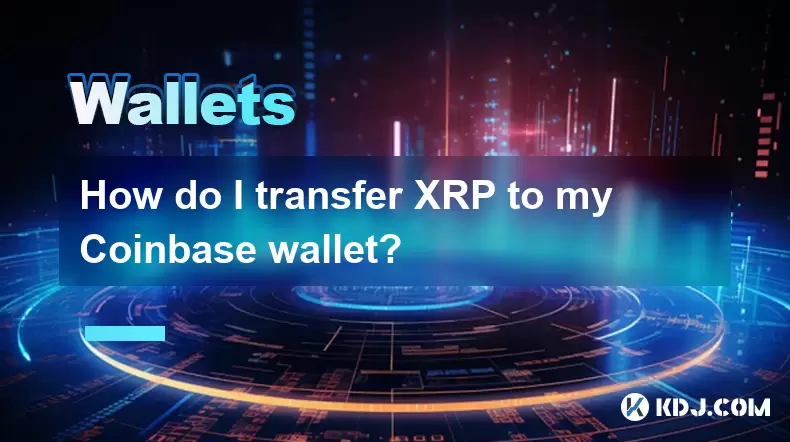
How do I transfer XRP to my Coinbase wallet?
Jun 16,2025 at 04:57pm
Understanding the Basics of XRP and Coinbase CompatibilityBefore initiating any transfer, it’s essential to confirm whether Coinbase supports XRP. As of recent updates, Coinbase has resumed offering XRP trading services on its platform after a period of uncertainty due to legal issues involving Ripple Labs. However, availability may vary depending on yo...

How do I deposit BNB into my Trust Wallet?
Jun 15,2025 at 03:56pm
Understanding BNB and Trust Wallet CompatibilityBefore initiating a deposit, it’s crucial to understand what BNB is and how it interacts with Trust Wallet. BNB (Binance Coin) is a utility token created by the Binance exchange. It can be used for paying transaction fees, participating in token sales, and more. Trust Wallet, on the other hand, is a mobile...
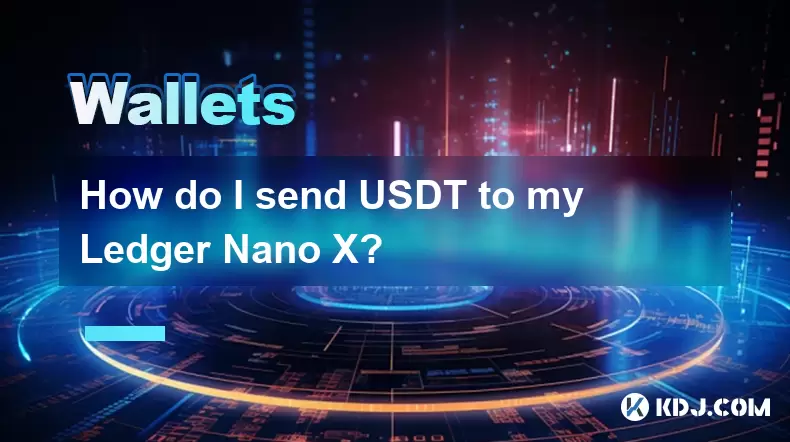
How do I send USDT to my Ledger Nano X?
Jun 15,2025 at 06:28am
What is USDT and Why Use Ledger Nano X?USDT, also known as Tether, is one of the most widely used stablecoins in the cryptocurrency ecosystem. It operates on various blockchain networks such as Ethereum (ERC-20), Tron (TRC-20), and others, offering users a digital asset pegged 1:1 to the US dollar. When it comes to storing USDT securely, hardware wallet...
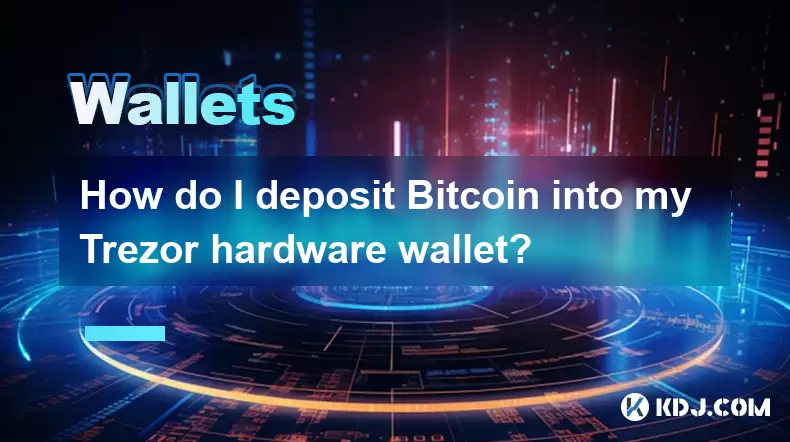
How do I deposit Bitcoin into my Trezor hardware wallet?
Jun 14,2025 at 12:29pm
What is a Trezor Hardware Wallet?A Trezor hardware wallet is a secure device designed to store cryptocurrencies offline, protecting them from online threats. Unlike software wallets, which are vulnerable to hacking and malware, Trezor stores private keys on the physical device itself. This ensures that transactions can only be approved by physically int...
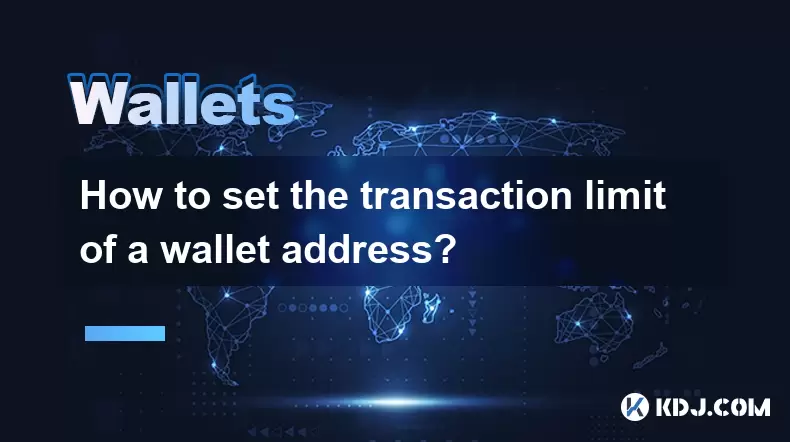
How to set the transaction limit of a wallet address?
Jun 16,2025 at 04:08am
Understanding the Concept of Transaction Limits in Cryptocurrency WalletsIn the cryptocurrency ecosystem, transaction limits refer to predefined restrictions placed on the amount of digital assets that can be sent or received by a wallet address within a specified timeframe. These limits are typically enforced by platforms such as exchanges, custodial w...
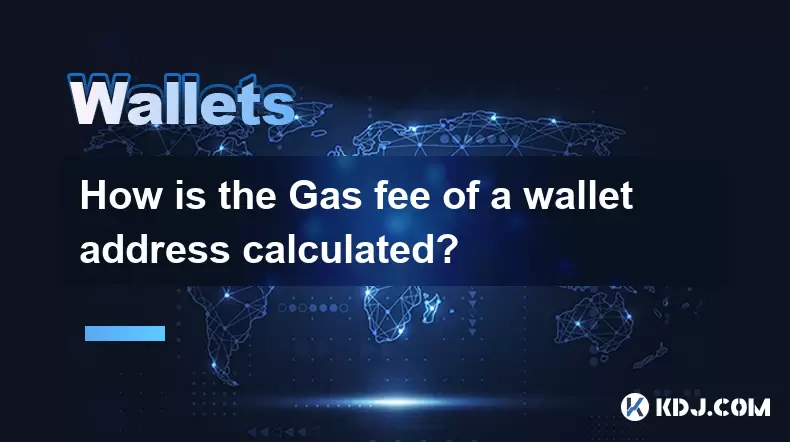
How is the Gas fee of a wallet address calculated?
Jun 14,2025 at 07:57pm
Understanding the Basics of Gas Fees in Blockchain TransactionsIn the cryptocurrency ecosystem, particularly within Ethereum-based networks, a Gas fee is an essential component of executing transactions or smart contract operations. The Gas fee serves as compensation for miners or validators who process and confirm transactions on the blockchain. It is ...

How do I transfer XRP to my Coinbase wallet?
Jun 16,2025 at 04:57pm
Understanding the Basics of XRP and Coinbase CompatibilityBefore initiating any transfer, it’s essential to confirm whether Coinbase supports XRP. As of recent updates, Coinbase has resumed offering XRP trading services on its platform after a period of uncertainty due to legal issues involving Ripple Labs. However, availability may vary depending on yo...

How do I deposit BNB into my Trust Wallet?
Jun 15,2025 at 03:56pm
Understanding BNB and Trust Wallet CompatibilityBefore initiating a deposit, it’s crucial to understand what BNB is and how it interacts with Trust Wallet. BNB (Binance Coin) is a utility token created by the Binance exchange. It can be used for paying transaction fees, participating in token sales, and more. Trust Wallet, on the other hand, is a mobile...

How do I send USDT to my Ledger Nano X?
Jun 15,2025 at 06:28am
What is USDT and Why Use Ledger Nano X?USDT, also known as Tether, is one of the most widely used stablecoins in the cryptocurrency ecosystem. It operates on various blockchain networks such as Ethereum (ERC-20), Tron (TRC-20), and others, offering users a digital asset pegged 1:1 to the US dollar. When it comes to storing USDT securely, hardware wallet...

How do I deposit Bitcoin into my Trezor hardware wallet?
Jun 14,2025 at 12:29pm
What is a Trezor Hardware Wallet?A Trezor hardware wallet is a secure device designed to store cryptocurrencies offline, protecting them from online threats. Unlike software wallets, which are vulnerable to hacking and malware, Trezor stores private keys on the physical device itself. This ensures that transactions can only be approved by physically int...

How to set the transaction limit of a wallet address?
Jun 16,2025 at 04:08am
Understanding the Concept of Transaction Limits in Cryptocurrency WalletsIn the cryptocurrency ecosystem, transaction limits refer to predefined restrictions placed on the amount of digital assets that can be sent or received by a wallet address within a specified timeframe. These limits are typically enforced by platforms such as exchanges, custodial w...

How is the Gas fee of a wallet address calculated?
Jun 14,2025 at 07:57pm
Understanding the Basics of Gas Fees in Blockchain TransactionsIn the cryptocurrency ecosystem, particularly within Ethereum-based networks, a Gas fee is an essential component of executing transactions or smart contract operations. The Gas fee serves as compensation for miners or validators who process and confirm transactions on the blockchain. It is ...
See all articles

























